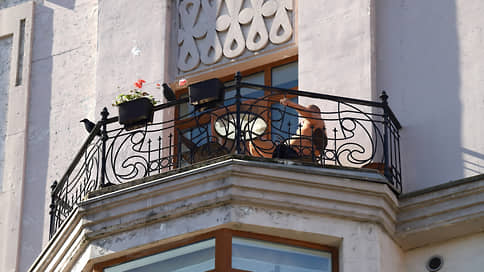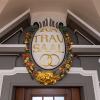KS decided the issue of coordination of balcony glazing

The Constitutional Court (KS) of the Russian Federation issued a ruling on the complaint of a resident of Kazan, who demanded to revise the article of the Civil Code (Civil Code) on property ownership in shared ownership. The complaint was based on the trial around the glazing of the balcony in the Kazanz apartment, which he made, enlisted the support of two -thirds of homeowners in the house. But the procedure in the courts was successfully disputed by the neighbor, which proved that the glazing of the balcony and the construction of the visor over it reduced the size of the common property in the house – its facade. And this is considered a reconstruction requiring the consent of all apartment owners. In the Constitutional Court, they did not consider the rights of Kazan violated.
KS made a definition (.pdf) on the complaint of Farhad Kuzyakhmetov, who in 2022 glazed the balcony in his apartment in Kazan and arranged a visor over him. The materials of the court say that he previously agreed with both the authorities and neighbors, securing the voices of more than two -thirds of housing owners at their general meeting. Living a floor above the neighbor, Mr. Kuzyakhmetov, Raid Garaev, went to court, demanding to bring the balcony to its original state. In March 2023, the Vakhitovsky District Court of Kazan satisfied the Neighbor’s demand, at the same time deciding to recover from Farhad Kuzyakhmetov for 500 rubles. Delayes for each day of non -fulfillment of the decision.
The position of the court came down to the fact that the glazing and arrangement of the visor “entailed a decrease in the size of the common property,” the Constitutional Court says.
The sole use of the latter is allowed only with the consent of all the owners of the premises, and not their part. Subsequent authorities, up to the Supreme Court of Tatarstan, the sixth cassation court and the Supreme Court of the Russian Federation, were upheld. In the highest courts, they referred to the results of the examination, which recognized the glazing of the balcony Farhad Kuzyakhmetov reconstruction, resulting in a decrease in the size of the common property of the house – the facade area.
Mr. Kuzyakhmetov turned to the Constitutional Court, considering the unconstitutional Art. 247 of the Civil Code of the Russian Federation (on the use of property in shared ownership). The applicant’s displeasure caused that the law enforcement practice of this article of the Civil Code of the Russian Federation obliges him to coordinate the glazing of the balcony with all the owners of the apartments.
The KS noted the intersection of interests of a significant number of citizens « in the process of managing apartment buildings. »
The instance indicated that the use of common property in the house “other persons” is allowed with the approval of two -thirds of the owners of apartments under Art. 46 of the Housing Code (LCD) of the Russian Federation. However, cases when one of the owners of apartments decided to use such property, the RF LC is not stipulated, “which entailed” the use of the lower courts of Art. 247 of the Civil Code of the Russian Federation. In turn, according to this article, property in shared ownership is used only with the consent of all its owners. In the Constitutional Court, they also referred to Art. 40 of the LC RF, according to which the need to obtain the consent of all apartment owners cannot be considered « as a disproportionate restriction of the right of ownership of citizens. » The complaint of Farhad Kuzyakhmetov was rejected.
Advisor to the Builder Bureau of the BVPP Susan Kirakosyan says that legally the requirement of a resident of Kazan looks unsubstantial, as it follows from the constitutional protection of property, « but laws must take into account the balance of interests of all owners. » The KS reasonably indicated at Art. 247 of the Civil Code of the Russian Federation and other norms obliging to coordinate with the rest of the owners of housing related to a decrease in common property, says Sergey Sergeyev, head of the housing and communal services of the Yakovlev and Partners Law Group.
The KS has repeatedly confirmed that the rule on the unanimity of the owners, enshrined in Art. 247 of the Civil Code of the Russian Federation, “in proportion to protecting the interests of all owners,” adds Ms. Kirakosyan. According to her, to replace double -glazed windows in the apartment, the consent of all homeowners in the house is not needed. But if “we are talking about the slightest changes in the parameters of the house”, including removable glazing, a visor or strengthening the facade with brackets, this is considered a reconstruction, and the norms of Art. 247 of the Civil Code of the Russian Federation. Mrs. Kirakosyan recognizes the logic of the norm about the one hundred percent consent of the residents to work with load -bearing structures in the house, but complains on her “heavyweight for minor improvements”: “If the neighbor refuses to vote at the meeting, disappears or dies, then it will not work to legalize.” The problem can be solved by amendments to the LC RF, leaving “unanimity for any manipulations with supporting structures”, and in other cases, by switching to a scheme with a qualified majority of votes of the meeting of the owners, the lawyer believes.





:format(webp)/s3/static.nrc.nl/wp-content/uploads/2025/04/04111243/data130287438-072114.jpg)
